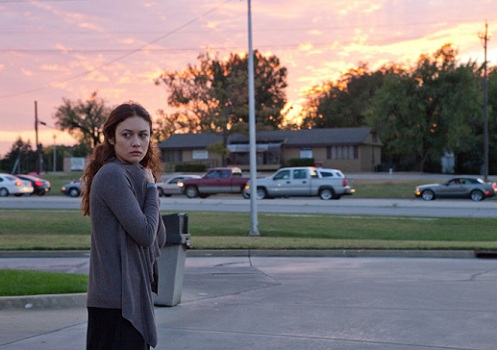Paolo and Vittorio Taviani have been making visionary films for more than four decades, but sometimes it feels like they've been gone from American screens for so long that very few people here remember them. Hopefully that injustice will be partly undone by the release on these shores of their latest, the compact and beautiful
Caesar Must Die, which won the Golden Bear at Berlin last year. (
Go here to read David Edelstein’s rave.)
The film portrays a group of inmates in Italy’s Rebibbio Prison putting on a performance of Shakespeare's
Julius Caesar. The film's actual cast consists of the same inmates, playing themselves playing the parts, and the film was shot in the prison. As in so many of their other works, the Tavianis blur the lines between the modern and the mythic, between emotional immediacy and the impulse to deconstruct, to analyze. They highlight the physicality of the actors -- the film is full of the earthiness and immediacy so characteristic of their work -- even as they depict the transcendental quality of these forgotten individuals' encounter with great art. (In some weird way, in its blending of the intimate with a distant poeticism, the film reminds me of Visconti's
La Terra Trema.) Meanwhile, the production of this most canonical of plays -- Shakespeare's most incantatory work, here revised to fit the actors' varied dialects -- spills out from the stage of the prison into its cells and common spaces. So much so that it becomes almost a cubist meditation on the enclosure of the self. As the inmates broaden their personal and psychological horizons, the Tavianis’ aesthetic entraps them further.
So, the film is magnificent, though perhaps it doesn't have the more accessible, epic grandeur of some of the Tavianis' better-known works. Indeed, at some point in the 1970s and 80s, these filmmakers were an international phenomenon, and deservedly so. I can think of few films greater than
Night of the Shooting Stars, with
Allonsanfan,
Kaos, and
Padre Padrone (which won a controversial Palme d'Or at Cannes back in the day) following close behind. I'd also highly, highly recommend the English language
Good Morning Babylon, an exquisite, sweeping, and decidedly weird drama of two Italian brothers who come to the U.S. and wind up working on the set of D.W. Griffith's
Intolerance. It was made at the height of their popularity, and flopped mightily -- suffering, perhaps, from the fact that the Tavianis were directing American and English actors, with an English-language screenplay, even though they themselves speak very little English. Nevertheless, as a teenager, I think I saw it something like twenty times. Get over the crazy dialogue, and it's amazing. (I bet it plays great in Italian, with subtitles.)
During the last New York Film Festival, I got to realize a lifelong dream of speaking to the Tavianis about the new film, and their work in general. Here's what came of it.
















